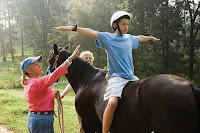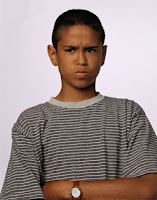Equine Therapy for Aspergers Children

"We have heard that therapy using animals is an effective method for treating symptoms of AS. Is there one animal therapy that stands out above the rest, or one that is recommended more often?" Typical treatment programs for Aspergers (high-functioning autism) focus on behavior modification and improvement. The complexity of the behaviors is gradually increased in an attempt to help the person continue developing. Medication is sometimes prescribed to people with Aspergers, but only to control symptoms like hyperactivity or seizures. There's currently no known cure for Aspergers. Research into animal assisted therapy is fairly new. However, even among professionals who believe more research is in order, there's a general consensus that therapy animals can be a highly beneficial addition to treatment programs for kids with Aspergers. Equine assisted therapy seems to have the best results. The rhythmic motion of riding a horse causes the kids to focus on th

